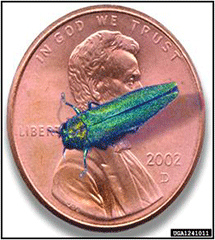April 11, 2017
Emerald Ash Borer Confirmed in Doniphan County
Submitted by Jennifer Williams

In a news release from Thursday, April 6, the Kansas Department of Agriculture, along with the U.S. Department of Agriculture, has confirmed the presence of emerald ash borer (EAB) in Doniphan County, Kansas.
On March 31, 2017, several EAB larvae were removed from an ash tree in a native stand of timber in rural Doniphan County near the town of Bendena by the Kansas Forest Service and KDA staff. Regulatory officials with USDA’s Animal and Plant Health Inspection Service’s Plant Protection and Quarantine (USDA-APHIS-PPQ) confirmed the presence of EAB on April 4, 2017.
After confirmation by KDA and USDA-APHIS-PPQ, Kansas will expand the EAB quarantine, currently in place in Atchison, Douglas, Jefferson, Johnson, Leavenworth and Wyandotte counties, to include Doniphan County to help slow the spread of EAB in Kansas. If Kansans outside of the quarantined areas think any of their trees may have the pest, they should notify KDA immediately at 785-564-6698 or KDA.ppwc@ks.gov.
Emerald ash borer, a pest of ash trees native to Asia, was first discovered in North America near Detroit, Michigan, in summer 2002. Since that time, the pest has killed millions of ash trees in Alabama, Arkansas, Colorado, Connecticut, Delaware, Georgia, Illinois, Indiana, Iowa, Kansas, Kentucky, Louisiana, Maryland, Massachusetts, Michigan, Minnesota, Missouri, Nebraska, New Hampshire, New Jersey, New York, North Carolina, Ohio, Oklahoma, Pennsylvania, Tennessee, Texas, Virginia, West Virginia and Wisconsin.
All Kansans will play an important role in monitoring for EAB. In cooperation with USDA-APHIS-PPQ, the Kansas Forest Service and K-State Research and Extension, KDA plans to host educational meetings in Doniphan County to provide information about EAB and to ensure that all necessary facilities and individuals are equipped to treat and dispose of EAB-infested material properly.
To learn the most current information on the quarantine, visit http://agriculture.ks.gov/EAB. To learn more about EAB, visit www.emeraldashborer.info.